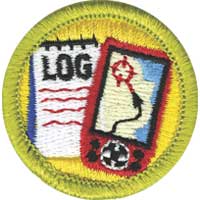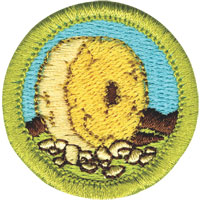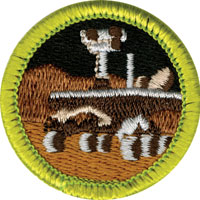Merit Badges
maps, charts, links, checklists, and cross-references for related Merit Badges and Scout Awards.
Merit Badges are the second main area of the Boy Scout advancement program. Unlike ranks, there is a degree of choice in the merit badge program. A sub-group of merit badges are known as Eagle required merit badges. To earn Eagle Scout, most of these badges must be earned although some are “either/or” badges. The remainder of the badges help with earning ranks as well as Eagle Palms after the Eagle Scout award has been earned. The online Merit Badge Application is a Word doc file.
Boy Scouts may work on merit badges from they time they join a Scout troop until they turn 18 years old. There is no time limit for completion of merit badges other than age 18. See the Merit Badge FAQ. Some Merit Badges Require Prior Approval before starting certain requirements. Most do not.
Introduction to Merit Badges
You can learn about sports, crafts, science, trades, business, and future careers as you earn merit badges. There are more than 100 merit badges. Any Boy Scout may earn any merit badge at any time. You don’t need to have had rank advancement to be eligible.
Pick a Subject. Talk to your Scoutmaster about your interests. Read the requirements of the merit badges you think might interest you. Pick one to earn. Your Scoutmaster will give you the name of a person from a list of counselors. These counselors have special knowledge in their merit badge subjects and are interested in helping you.
Scout Buddy System. You must have another person with you at each meeting with the merit badge counselor. This person can be another Scout, your parents or guardian, a brother or sister or other relative, or a friend.
Call the Counselor. Get a signed merit badge application from your Scoutmaster. Get in touch with the merit badge counselor and tell him or her that you want to earn the merit badge. The counselor may ask to meet you to explain what is expected of you and to start helping you meet the requirements. You should also discuss work that you have already started or possibly completed.
Unless otherwise specified, work for a requirement can be started at any time. Ask your counselor to help you learn the things you need to know or do. You should read the merit badge pamphlet on the subject. Many troops and school or public libraries have them.
Show Your Stuff. When you are ready, call the counselor again to make an appointment to meet the requirements. When you go take along the things you have made to meet the requirements. If they are too big to move, take pictures or have an adult tell in writing what you have done. The counselor will ask you to do each requirement to make sure that you know your stuff and have done or can do the things required.
Get the Badge. When the counselor is satisfied that you have met each requirement, he or she will sign your application. Give the signed application to your Scoutmaster so that your merit badge emblem can be secured for you.
The current Boy Scout Requirements book is available from your local Scouting merchandise distributor. It may also be ordered online at www.scoutstuff.org.  Requirements for the Astronomy, Horsemanship, and Nuclear Science merit badge have extensive changes. Those with minor revisions include Archery (5, options A[f]2 and B[f]2) and Sports (2). Geocaching, Inventing, and Scouting Heritage are new merit badges.
Requirements for the Astronomy, Horsemanship, and Nuclear Science merit badge have extensive changes. Those with minor revisions include Archery (5, options A[f]2 and B[f]2) and Sports (2). Geocaching, Inventing, and Scouting Heritage are new merit badges.
The 2009 printing of the Boy Scout Handbook inadvertently included bugler as a position of responsibility under Eagle Scout requirement 4; it is not. The requirements in the 2011 Boy Scout Requirements book are correct and official.
Requirements. You are expected to meet the requirements as they are stated—no more and no less. You are expected to do exactly what is stated in the requirements. If it says “show or demonstrate,” that is what you must do. Just telling about it isn’t enough. The same thing holds true for such words as “make,” “list,” “in the field,” and “collect,” “identify,” and “label.”
The requirements listed here are the official requirements of the Boy Scouts of America. However, the requirements presented here might not match those in the Boy Scout Handbook and the merit badge pamphlets, because these requirements are updated only when the Boy Scout Requirements book is updated. The only significant difference is that as new merit badges are introduced, the requirements are posted here.
If a Scout has already started working on a merit badge when a new edition of the pamphlet is introduced, he should continue to use the same merit badge pamphlet and fulfill the requirements therein to earn the badge. He need not start all over again with the new pamphlet and possibly revised requirements.
Resources
Merit Badge Requirements
Below is a list, in alphabetical order, of all of the current merit badge subjects. Click each subject to see the requirements for that merit badge. Merit Badges with a SILVER Boarder are Eagle Merit Badges


































































































































